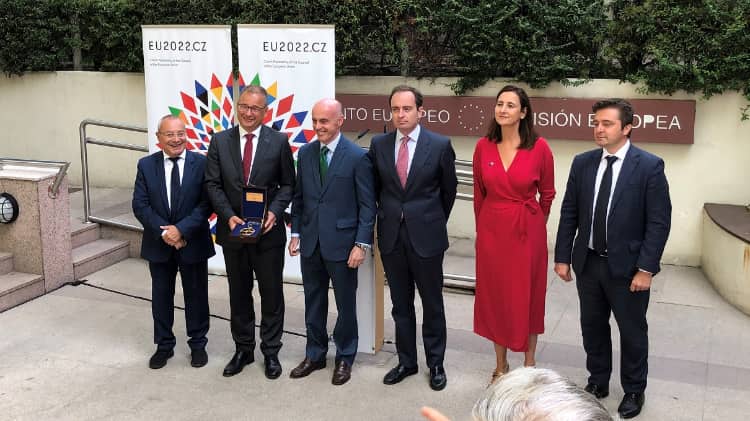The Diplomat
The refugee crisis in Ukraine and its post-war reconstruction will be one of the priorities of the Czech presidency of the European Council, which was officially launched yesterday at the headquarters of the European institutions in Madrid.
During his speech, the Czech Republic’s Ambassador to Spain, Ivan Jančárek, also mentioned the other “current challenges of Europe in different areas” that will be a priority for the Czech government: “equally, we want to focus on energy security, strengthening European defence capabilities and cyber security”.
“We understand”, the ambassador added, “the importance of maintaining the stability of our common economy, and that is why we will work on ensuring its resilience. Our image is of a united, strong and sustainable Europe. In addition, we want to emphasise the democratic institutions, whose important role has been particularly felt in recent months”.
Since 1 July, the Czech Republic has taken over from the French Presidency, whose flag was lowered at the same time as the flag of the incoming presidency was raised. In his speech, the French ambassador, Jean-Michel Casa, took stock of the six months of the French presidency and, echoing the words of President Macron, said that “we are leaving behind a Europe that is very different from that of January 2022”, in which “profound transformations have taken place, while war has once again struck our continent. As we worked to respond in solidarity to Russia’s aggression against Ukraine, together, we have continued to work on the great seams of the future for our Europe, to build a Europe that is not only more sovereign, but also greener and more humane. We have managed to live up to history. Europe has hit its stride.
The Czech presidency intends to work in five areas with a mission defined by its motto: “Europe as a task”. The first area is Ukraine: the focus will be on the response to the refugee crisis and post-war reconstruction. The second will be energy: work will continue on breaking energy dependence on Russia and further diversifying the EU’s energy sources. The third priority is defence, where the EU-NATO relationship will be given greater prominence, as well as cyber security and the fight against terrorism. In economic matters, free trade agreements will be prioritised and cooperation between the EU and the United States will be strengthened. The fifth pillar will be that of democracy, where civil society and the protection of human rights will have a place.
In addition, the presidency has established different priority geographical areas: Eastern Europe, the Western Balkans, the Indo-Pacific and the Sahel.
The event was also attended by Alejandro Abellán, Director General of Internal Market and other Community Policies of the Ministry of Foreign Affairs; Serhii Solovei, First Secretary of the Ukrainian Embassy in Spain; Lucas González Ojeda, Deputy Director of the European Commission Representation in Spain; and María Andrés, Director of the European Parliament Office in Spain.





